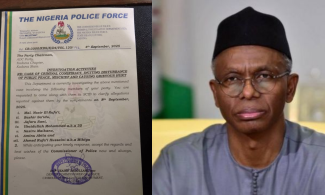
Samuel Omang
Kaduna’s political atmosphere turned combustible on Monday as former governor Nasir El-Rufai escalated his face-off with the state’s police command, filing a petition against Commissioner of Police Muhammad Rabiu over what he described as “serial violations, abuse of office, and unprofessional conduct.” The dramatic twist followed last week’s police shutdown of the African Democratic Congress (ADC) secretariat in Kaduna and a summons served on El-Rufai alongside six top party leaders for alleged conspiracy, incitement, mischief, and disturbance of public peace.
Instead of honouring the invitation, El-Rufai dragged the police boss before the Police Service Commission, accusing him of “egregiously unlawful behaviour” and warning that the force was sliding into serving “interests other than those conferred by law.” In a strongly worded statement signed by his media aide, Muyiwa Adekeye, the former governor said the Nigeria Police must be supported but also held accountable, urging the PSC to enforce discipline and ethical conduct within its ranks.
The crisis deepened after police operatives stormed and sealed the ADC’s state office at No. 4 Ali Akilu Road last Thursday, just hours before the party’s North-West leadership was expected for a solidarity visit. The meeting was meant to console members injured when political thugs, allegedly aided by police inaction, attacked the party the previous week.
El-Rufai accused the commissioner of hiding behind an unsubstantiated court order to stifle opposition voices, insisting that no such order had been properly served. “We have not seen any order. It was never properly served on us. Even if such exists, there is a legal process for serving affected parties. The commissioner knows what he is doing is unconstitutional,” he fumed. Despite his outrage, he said ADC leaders chose to avoid confrontation by respecting the commissioner’s claim, even while doubting its authenticity.
In a letter dated September 4, the police directed ADC State Chairman Bashir Sa’idu to produce El-Rufai and six others—including Jafaru Sani, Ubaidullah Mohammed (“30”), Nasiru Maikano, Aminu Abita, and Ahmed Rufa’i Hussaini (“Mikiya”)—before the State Criminal Investigation Department on September 8. But El-Rufai shunned the summons, opting instead to challenge the police at the national regulatory level. He hinted that the matter may drag into the courts, warning that, “We want to see that order and, of course, we will challenge it to the Supreme Court. This is not the end of it. Other things will follow.”
The Kaduna State Government, however, insists the ex-governor is stirring unrest. Commissioner for Internal Security, Dr. Shehu Shuaibu, accused El-Rufai of scheming to destabilise Kaduna’s “hard-won peace” after the ADC suffered setbacks in recent by-elections. “Anyone who dares to threaten peace—be it Nasir El-Rufai or his accomplices—will be held accountable,” Shuaibu vowed.
The latest confrontation adds to the turmoil within Kaduna ADC ranks. While thugs unleashed mayhem at party meetings last week, injuring members and destroying property, the police were accused of turning a blind eye. ADC leaders also distanced themselves from El-Rufai’s role in inaugurating a transition committee during a disputed event, branding it “fraudulent” and “destabilising.” For now, the political battle lines are sharply drawn: El-Rufai and the ADC leadership on one side, the police and state government on the other. As petitions fly and threats escalate, Kaduna’s fragile peace hangs in the balance.
